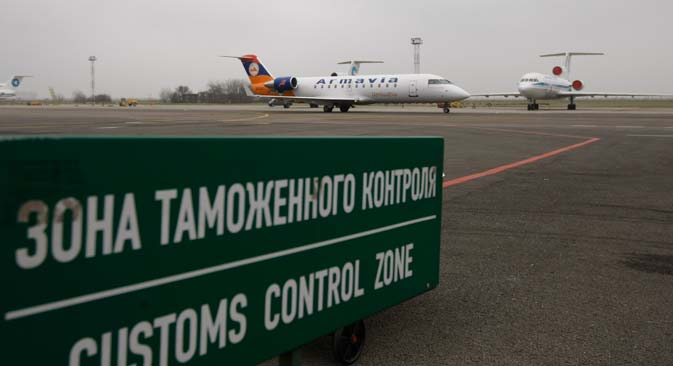
Bundestag minister Karl-Georg Wellmann was denied entry to Russia without explanation on May 24. Source: Valery Matytsin / TASS
The Russian Foreign Ministry is considering the possibility of publishing its blacklist of individuals barred from entering Russia following a recent scandal involving a German Bundestag minister who was not allowed into the country on arrival in Moscow.
Karl-Georg Wellmann, a Bundestag minister and the chairman of a German-Ukrainian parliamentary group, was denied entry to Russia without explanation on May 24 after he had arrived at Moscow’s Sheremetyevo Airport.
According to media reports, Wellmann had frequently and sharply criticized Russia's foreign policy, describing the conflict in the Donbass region of eastern Ukraine as a "Russian war" and supporters of the area’s breakaway regions as "instruments of Russia.
Following the incident, Vice President of the Bundestag Johannes Singhammer postponed his visit to Russia, demanding that Russia publish its blacklist so that those barred from entering Russia should not find about it only at the border.
Speaking about the possibility of the publication of the blacklist, Russian Deputy Foreign Minister Alexei Meshkov said on May 27 that the "conflicts that arise ... are forcing us to think about this."
However, Meshkov insisted that those placed on Russia's blacklist "have the full opportunity to find out whether they are established as such by applying to any Russian consular office abroad."
The blacklist was introduced by the Russian side as a response to personal sanctions imposed by Western countries against a number of Russians last year after the crisis in Ukraine had entered its acute phase.
However, the lists of individuals who have fallen under Western sanctions have been published, while the Russian blacklist has not.
Defending Russia’s position of not publishing the blacklist to date, Meshkov stated that the "line that we have set on the protection of the personal data of individuals barred from entry ... has been more appropriate than that of our Western partners who trumpeted some names or other to the world."
Even if the demand that the Russian list be published looks logical and appropriate in the light of the fact that Western lists have been published, the "Russian leadership is not obliged to reveal these lists to anyone," Deputy Director of the Institute for Strategic Assessments Viktor Mizin told RBTH.
According to Mizin, this is a strong move – "like in a poker game when you do not know what you can run into" – made in order to, as Moscow believes, "make people think about the statements they come up with."
Responding to a question about how blacklists are drawn up, the analyst said that they are the result of a collective decision by a number of agencies – law-enforcement and political intelligence agencies as well as the Security Council and the Foreign Ministry.
At the same time, some experts believe that the publication of blacklists by the Russian side would be a step in the right direction.
According to Mikhail Troitsky, a professor at the Moscow State Institute of International Relations and the deputy head of the Moscow branch of the MacArthur Foundation, the situation is not in Russia’s interests, since the person involved in the latest incident is a high-profile politician.
Alexander Konovalov, president of the Institute of Strategic Studies, also told RBTH that the blacklist should be published, along with explanations of the reasons behind the prohibition on entry.
All rights reserved by Rossiyskaya Gazeta.
Subscribe
to our newsletter!
Get the week's best stories straight to your inbox